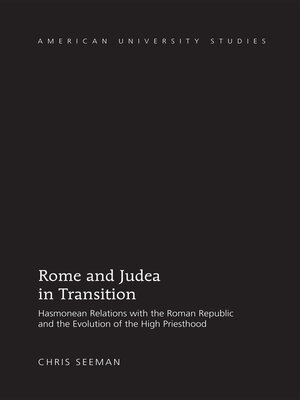Rome and Judea in Transition
ebook ∣ Hasmonean Relations with the Roman Republic and the Evolution of the High Priesthood · American University Studies
By Chris Seeman

Sign up to save your library
With an OverDrive account, you can save your favorite libraries for at-a-glance information about availability. Find out more about OverDrive accounts.
Find this title in Libby, the library reading app by OverDrive.



Search for a digital library with this title
Title found at these libraries:
| Library Name | Distance |
|---|---|
| Loading... |
Rome and Judea in Transition is the first English-language book to study exclusively the first century and a half of Roman-Judean political relations (164–37 B.C.). It presents a comprehensive reassessment of the Late Republic's involvement in the Levant, the motives of Hasmonean diplomacy, and the development of the Jewish high priesthood. Therefore, it is of interest to classicists, ancient historians, biblical scholars, and students of Judaica alike.
Previous studies have often mischaracterized this period as a consistent unfolding of Rome's hegemonic will at Jewish expense. By contrast, this book argues that the Republic harbored no imperial designs on Judea prior to Pompey's opportunistic intervention in 63 B.C., and that Rome's subsequent intermittent meddling in the region's governance did not significantly alter the dynamics of the Hasmonean state. Only with the Parthian invasion of Syria in 40 B.C. – and because of it – did the Republic unilaterally reshape Judean politics by its elevation of Herod the Great as «King of the Jews.»
Judea's alliance with Rome began in the context of Judas Maccabeus' revolt against Seleucid rule. Scholars have therefore understandably assumed that the primary hope of Judas' successors was that Roman recognition would secure and extend Judean sovereignty. This book argues that the main motive for Hasmonean diplomacy was domestic: to advertise the legitimacy of the Maccabees against their Jewish rivals. For this reason, the documentary record of relations with the Republic is of great value for studying the ideology and institutional growth of high priestly power during this period.
Previous studies have often mischaracterized this period as a consistent unfolding of Rome's hegemonic will at Jewish expense. By contrast, this book argues that the Republic harbored no imperial designs on Judea prior to Pompey's opportunistic intervention in 63 B.C., and that Rome's subsequent intermittent meddling in the region's governance did not significantly alter the dynamics of the Hasmonean state. Only with the Parthian invasion of Syria in 40 B.C. – and because of it – did the Republic unilaterally reshape Judean politics by its elevation of Herod the Great as «King of the Jews.»
Judea's alliance with Rome began in the context of Judas Maccabeus' revolt against Seleucid rule. Scholars have therefore understandably assumed that the primary hope of Judas' successors was that Roman recognition would secure and extend Judean sovereignty. This book argues that the main motive for Hasmonean diplomacy was domestic: to advertise the legitimacy of the Maccabees against their Jewish rivals. For this reason, the documentary record of relations with the Republic is of great value for studying the ideology and institutional growth of high priestly power during this period.







